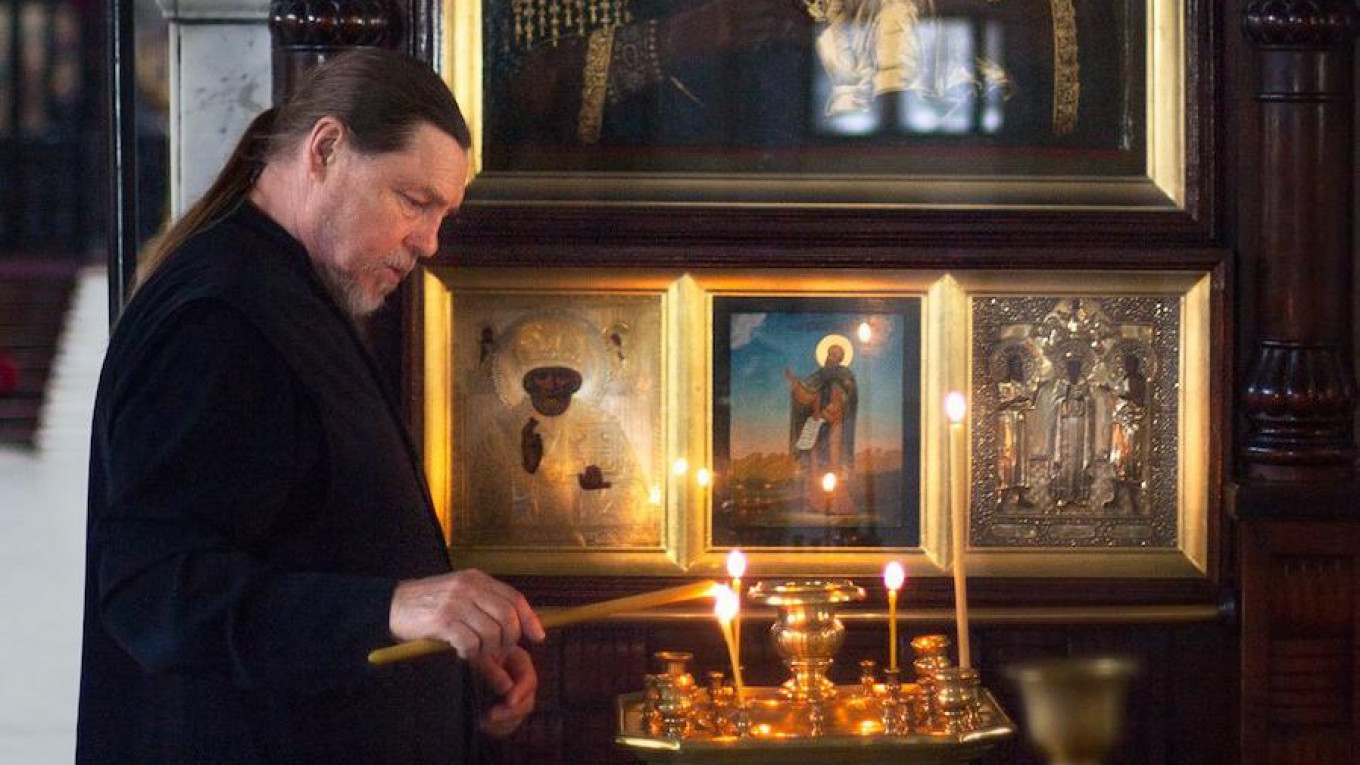More than 100 pilgrims from all over Russia have come to witness the exorcism. Father Vladimir stalks between them — breathing heavily and looking into their eyes. “Lord, forgive my Soviet forefathers for repudiating God,” he intones. With their heads hung in fear, the pilgrims repeat: “Lord, forgive my Soviet forefathers for repudiating God.”
“God is willing to forgive our grandmothers who were Communists and burned icons,” says Father Vladimir. “But you must pray for them.”
A woman falls to the floor and begins convulsing immediately after Father Vladimir’s ritual prayers conclude. Cries and moans go up on all sides of the circle of pilgrims. Gradually, they grow louder.
“Shut your devil’s mouth!” Father Vladimir shouts — presumably to the evil spirit possessing the women — before thrashing her across her mouth and stomach with a book.
“By the power of Christ, begone you demons,” the priest yells. “Out with the generations of alcoholism, drug addiction, and cancer. Expel the demon as you exhale. Out with the demons that make us gain weight! Out with the demon of our parents’ curse! I command you, begone you filthy devils!”
The pilgrims exhale loudly, wave their arms and legs, and bend over. They do everything they can to expel the demons from their bodies. One nauseated person spits into a clear plastic bag, projecting the remains of a demon out of her body.
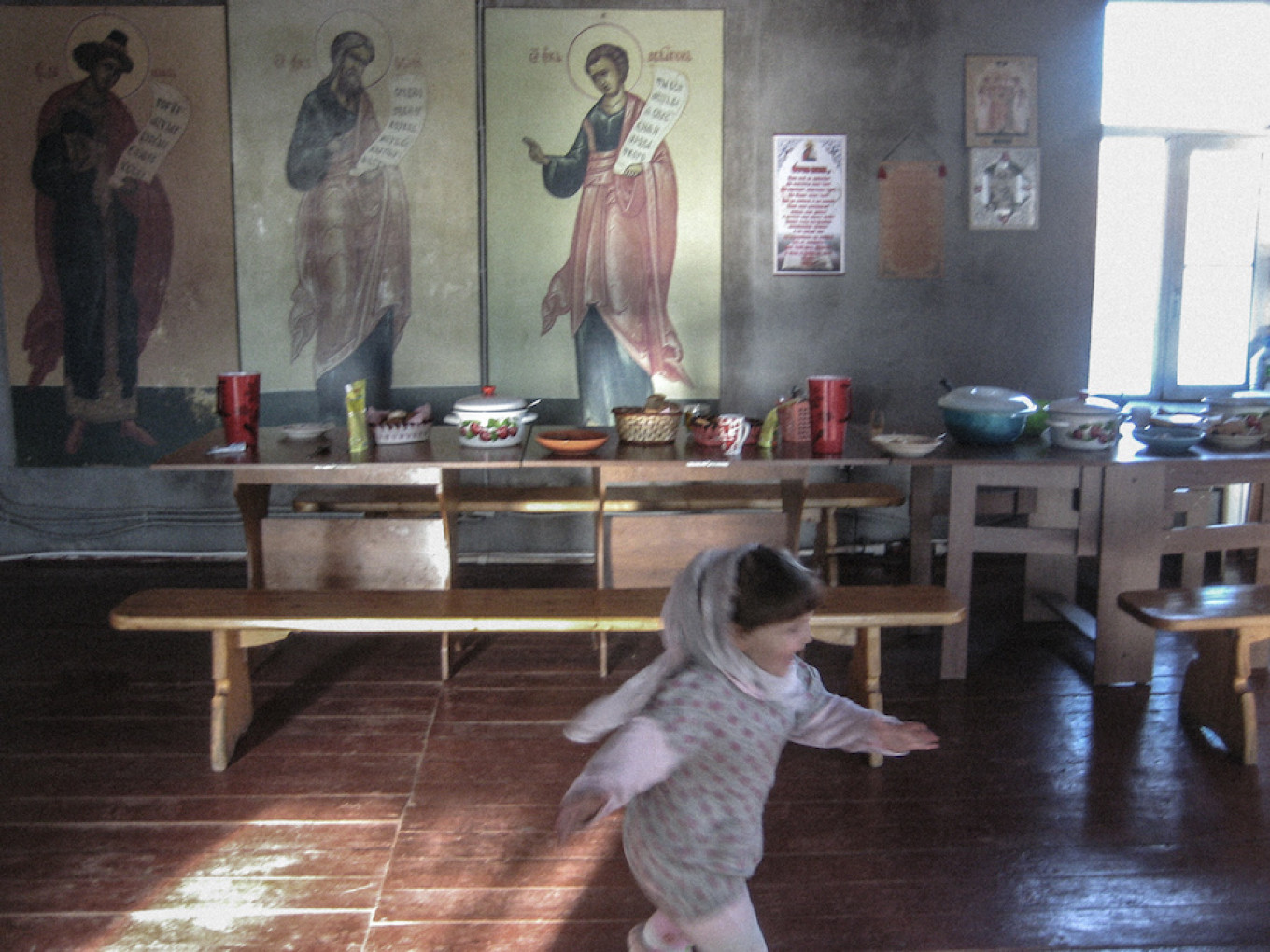
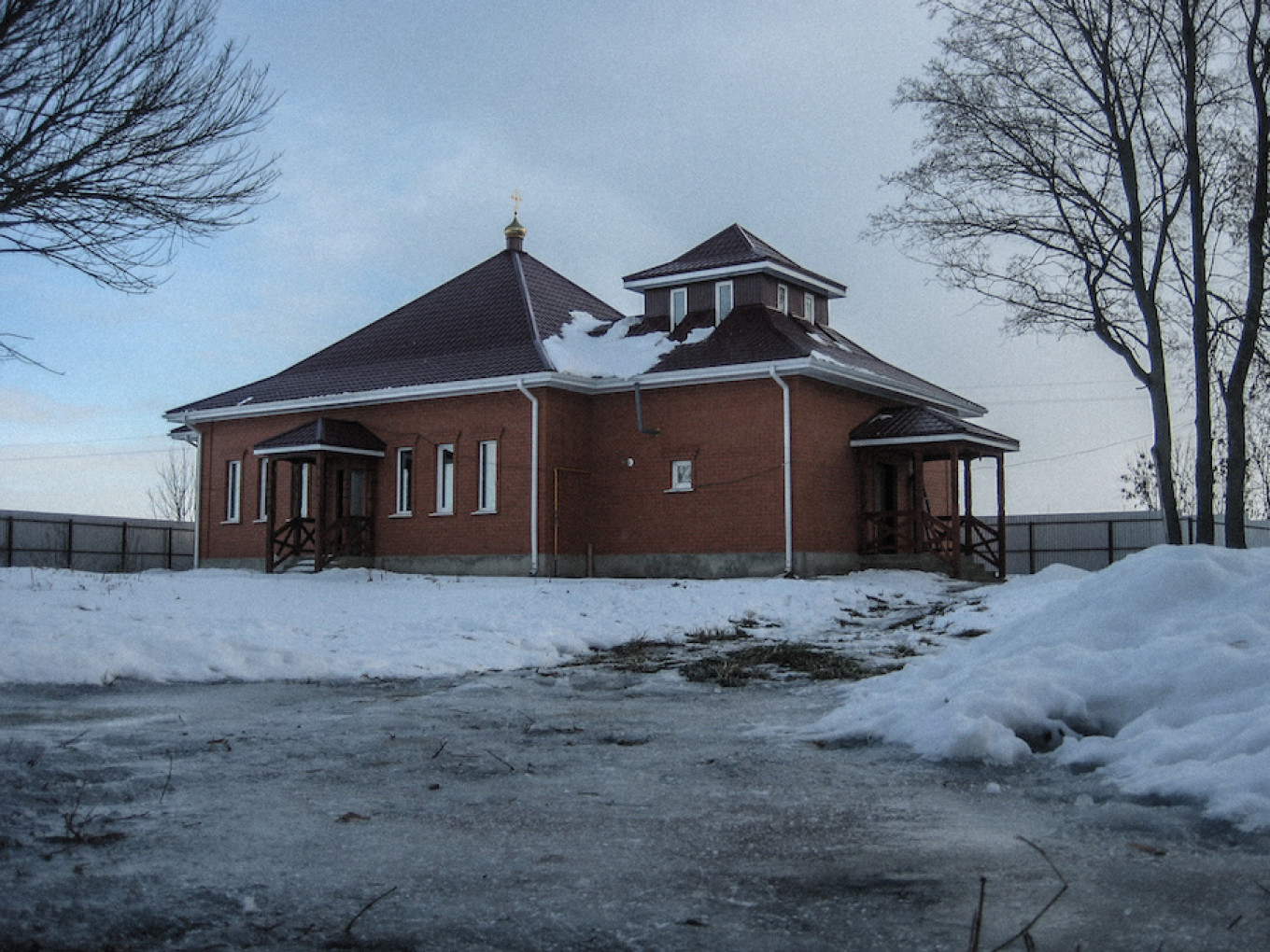
From Rockstar to Exorcist
Only a handful of priests in Russia perform exorcisms, and 64-year-old Vladimir Gusev is chief among them. Much like his work as a priest, his path to the altar was anything but conventional. Gusev first studied to become a dog handler, before serving in the army and studying singing.
In 1992, he and his wife moved to the village of Stanovoi Kolodez, some 300 kilometers south of Moscow, where he received the blessing of the patriarch. Soon afterward, he began reading prayers for casting out evil spirits.
Ten years later, Gusev founded the Pokrov (Shroud) rehabilitation center for people afflicted by drug and alcohol addiction, occult practices, and membership of repressive cults. At the same time, Gusev became lead vocalist in the newly formed musical group The Exorcist, the first band — as legend has it — to receive the blessings of the Russian Orthodox Church.
But Gusev left the band after a public uproar over a photoshoot, which depicted him as a fallen woman. The move would kickstart a solo career.
In a video he posted to Vkontakte for his song “Lenin from the Walls of the Kremlin,” which commemorates the 100th anniversary of the “1917 tragedy,” Gusev dons a black robe, his hair flutters in the wind. Vladimir Lenin appears in the background with a burning pentagram on his forehead. Gusev sings: “You erected an altar to Satan in the heart of the Motherland and defiled the ancient Kremlin with the mausoleum of Lenin. You and Lenin will burn together in hell!”
Father Vladimir’s Vkontakte page now features rave reviews of his miraculous exorcising abilities. One satisfied client explains how his home life improved—and family members even managed to lose weight—after Vladimir rid their home of demons. Another reviewer testifies that he was able to sell his apartment only after the priest evicted ghostly residents: “Father Vladimir freed me of my ancestral curses,” 30-year-old Anastasia, a Muscovite, happily wrote.
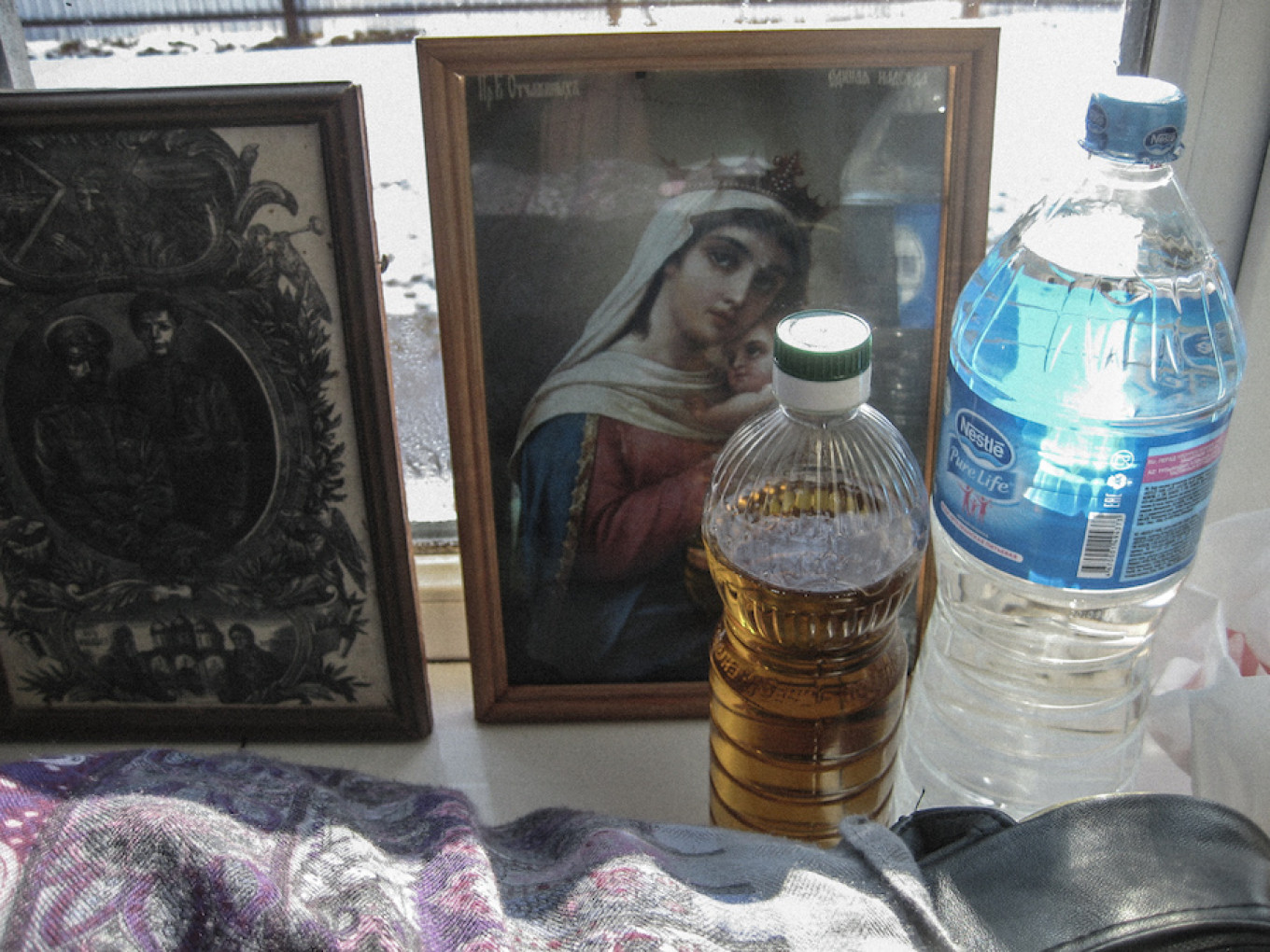
Fighting the Demons
Father Vladimir offers two services: individual meetings or a pilgrimage to Mikhailovskoye village in the Oryol region, where he serves a congregation. Pilgrims can choose to take up a tour package in a minibus that leaves Moscow every weekend. This program includes two nights bed and board, religious rites, prayers, communion, confession, a one-on-one discussion with the priest and, most importantly, exorcism.
One of the pilgrims making their way to Oryol this week is Nikolai, a 67-year-old security guard. He works at an elite Moscow restaurant, and this is where his problems began. He’d met a female chef from Ukraine, who, he says, “began loading him up” with baked pies. Later they began an affair. His mistress demanded that he divorce, but Nikolai could not leave his wife.
Nikolai believes that his mistress consulted a sorcerer and that all of his bodily ailments are that wizard’s handiwork. “One priest told me that my demons come from Ukraine,” he says. “War is raging there and people are killing each other. I will go to Father Vladimir, fall at his feet, and pray: ‘Cast them out however you can.’”
Another pilgrim, Nelly, has a lump on her wrist the size of a pea. “This demon travels through my body, making me suffer,” she says.
The minibus stops at a grocery store where the pilgrims buy cooking oil. Father Vladimir promises to bless the oil which they can then rub on their sore spots.
Nelly’s demon has been with her for a year. She originally suffered from problems with the vertebrae in her neck restricting the blood flow to her head. Doctors prescribed pills, but they did not stop the pain. Then she visited a healer who advertised on television. Unfortunately, the healer turned out to be a sorcerer. So Nelly paid him a fee equal to three monthly pension checks and lost 13 kilograms as a result.
“He opened a portal in me,” she says. “I am withering away and want to die. It feels as if these peas are wriggling all through my body. They prevent me from sleeping. It is so painful. I am a mess.”
The faithful refer to the Pokrov facility — a former hospital with a guesthouse, church, well, summer gazebo, and river just across the road — as a “retreat for the soul.” The building itself smells of fresh paint. Uncomfortably so. New rooms are under construction to meet the growing demand for exorcism. The walls are still made of simple concrete, but now stand adorned with life-size images of saints.
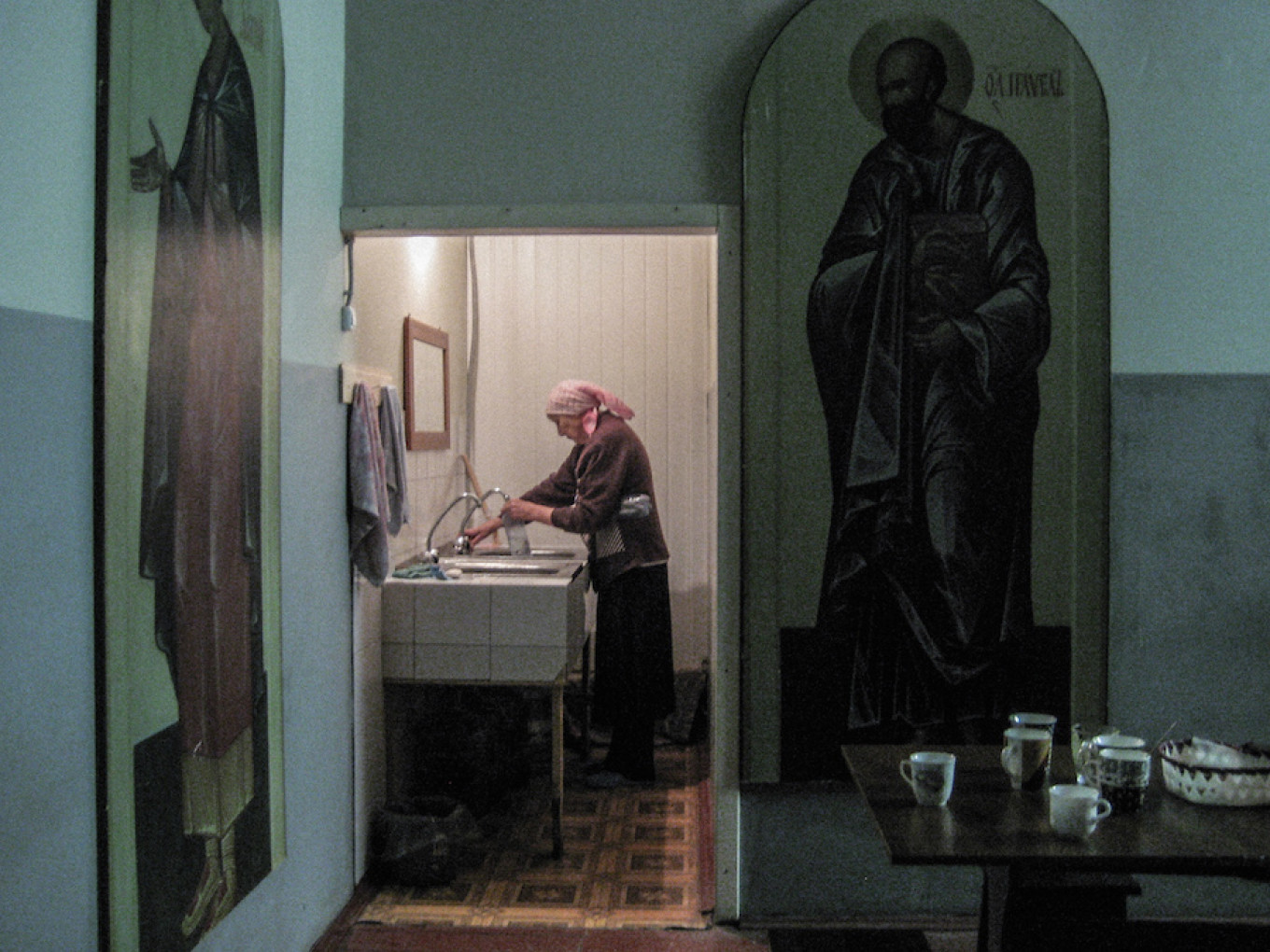
Sins of the Forebears
After conversing with the priest, a pilgrim named Yelena lies down on her side and quietly cries. She says she came here from Nizhny Novgorod.
“I feel offended,” Yelena says through her tears. “The priest told me my father is cursed, and that the curse began three generations back with my grandfather who was a communist. I am a physical therapist and I do not appreciate such harsh statements. My father is a decent man, a great family man. He fought in the war, and everyone who fought in the war goes to heaven.”
Her troubles began, she believes, after she pulled out a wine cork that had been wedged in a doorway. The cork had a piece of black hair wrapped around it, which she understood to be black magic. She immediately had the apartment blessed by a priest, and when she went to take communion, the priest told her she was bewitched and needed an exorcist.
“My legs hurt, my tailbone feels like it’s falling off and I have pains near my heart,” Yelena complains. “The doctor tells me I’m neurotic and need to go to a psychotherapist.”
According to priest Alexei Uminsky, exorcism grew in popularity as new people without theological education entered the church following the fall of the Soviet Union twenty five years ago. “It is typical shamanism,” he says. “The idea of sacrificing something for your ancestors existed in ancient paganism and in very primitive cults.”
Eventually, my turn comes. The priest sits across from me at a table cluttered with icons. He looks quickly through my list and says: “The curse comes from man to woman through lustful relations. Science, as well as Orthodox traditions, have proven this.”
Father Vladimir suddenly pours holy water over me. I shudder. As he mops up the floor he says, “You have an impure spirit in you. I tested that just now and it appeared. Don’t you feel it yourself? It will leave only when you start leading a proper Christian life.”
That night I go to the kitchen. “This is war and the path is difficult. After prayers, the demon wants to rob you of your grace,” I am told by Svetlana, who organized the trip.
After a short pause, she reaches into her bag for a blister pack of tablets. I recognize them as Phenazepam, a drug designed for psychiatric and neurological disorders.
This is an abridged and adapted version of an article first published on
the Takiedela.ru website.
A Message from The Moscow Times:
Dear readers,
We are facing unprecedented challenges. Russia's Prosecutor General's Office has designated The Moscow Times as an "undesirable" organization, criminalizing our work and putting our staff at risk of prosecution. This follows our earlier unjust labeling as a "foreign agent."
These actions are direct attempts to silence independent journalism in Russia. The authorities claim our work "discredits the decisions of the Russian leadership." We see things differently: we strive to provide accurate, unbiased reporting on Russia.
We, the journalists of The Moscow Times, refuse to be silenced. But to continue our work, we need your help.
Your support, no matter how small, makes a world of difference. If you can, please support us monthly starting from just $2. It's quick to set up, and every contribution makes a significant impact.
By supporting The Moscow Times, you're defending open, independent journalism in the face of repression. Thank you for standing with us.
Remind me later.


